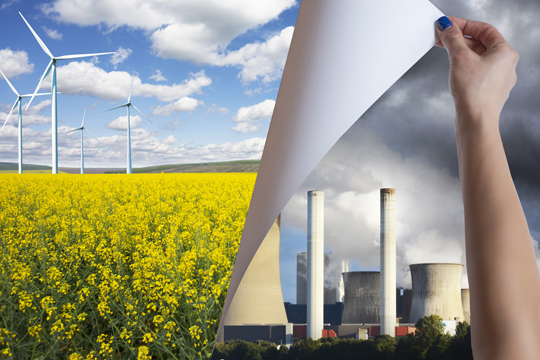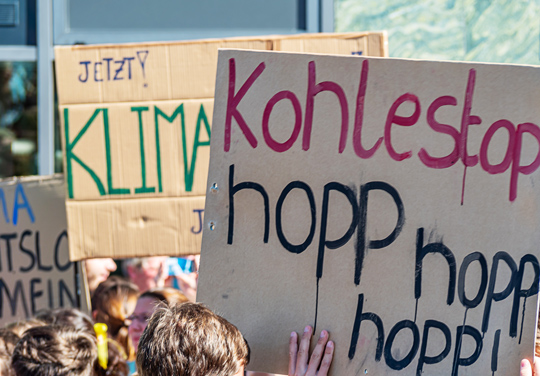New energy for the trinational area
Freiburg, Jan 03, 2020
Coal causes greenhouse gas emissions, wind turbines disfigure the landscape, nuclear power is dangerous. There seems to be a lot of fury but little agreement on the question of suitable energy sources. What alternatives could still be used to cover power consumption? The “RES-TMO” (Renewable Energy Sources - Trinational Metropolitan Region Upper Rhine) research project is investigating how a mix of renewable energies could look while securing the power supply for the Upper Rhine region.

The researchers are developing a concept for the Upper Rhine region - the electricity demand is to be covered by alternative energy sources. Photo: adrian ilie825/stock.adobe.com
In Germany, the buzzwords “nuclear phase-out” and “coal phase-out” have been commonplace for several years or even decades, and the energy turnaround is a declared political goal. In France, too, a shift in thinking is taking place, albeit only recently. In November 2019, the French National Assembly passed a new law in response to the climate protests. In December 2019, EU government leaders agreed on a clear goal. By 2050, Europe should become “climate neutral,” i.e. all greenhouse gases must be avoided or stored.
But how can these goals be achieved? There seems to be a consensus that nuclear power, coal-fired power and fossil fuels must be reduced and replaced by renewable energy sources. Biomass, hydropower, geothermal energy, wind power and solar energy in particular represent an alternative, says Ines Gavrilut, manager of the RES-TMO project at the University of Freiburg. “However, the share of renewable energies in the European Union’s energy mix in 2017 was only 13.6 percent. In order to adapt the supply to the political goals and to ensure it in the long term, this share must be increased significantly.” A complete reconstruction of the energy supply is necessary.
A team from Eucor - The European Campus, which includes scientists from different departments of the Universities of Freiburg, Haute-Alsace, Strasbourg, the Karlsruhe Institute of Technology and the French National Centre for Scientific Research (CNRS), is looking into how this conversion might look like. The team is investigating how renewable energies can be used in the border region in the most socially acceptable way. At the end of the project, a concept for a regional energy system in the so-called Upper Rhine Trinational Metropolitan Region (TMO) is to be developed, which could also serve as a model for other European border regions, says Gavrilut.
Avoiding extensive transport distances
“The conversion of the energy supply to renewable energies is a big challenge, we have to take different factors into account,” explains the head of the project, Prof. Dr. Barbara Koch from the University of Freiburg. “So far, there have been individual investigations, but no overall, transnational study. We are therefore including technical, physical and economic as well as socio-cultural and legal aspects in Germany, France and Switzerland in our investigation.”
Coal-fired or nuclear power plants provide a central and stable energy supply, but are associated with health risks, Koch explains: “Renewable energies, on the other hand, are distributed and predominantly fluctuating energy.” Consequently, the question of storage arises. “The intermediate storage of energy is of central importance for the security of supply. We will therefore investigate the role of former mines in the region as energy storage facilities.”

“Kohlestopp – hopp, hopp, hopp” (“Coal stop – chop, chop, chop”): Demonstrators demand a shift in thinking about the environment. Photo: Animaflora PicsStock/stock.adobe.com
The team will also examine the frequent long-distance transport of electricity from the producer to the consumer. The researchers hope that the production and consumption of renewable energy in the region will be strengthened, which would result in less electricity being transported via high-voltage lines, thereby reducing the expansion of such lines. Instead, feed-in and distribution networks from the three countries are to be linked together. “At present, there is only one cross-border power line on the Upper Rhine,” reports Gavrilut. “This is too little for an energy region that wants to cross borders.”
Taking cultural differences into account
Philippe Hamman, Professor of Sociology at the University of Strasbourg, is responsible for the analysis of socio-cultural aspects at RES-TMO and points out another factor. “Renewable energies have a different status in the three countries, depending on the respective cultural and political framework. The acceptance of wind power, for example, remains low in north-eastern France, especially in Alsace; in Germany, the population is divided. Although nuclear power is increasingly being discussed in France, it retains positive perceptions for some people, while in Germany it is clearly opposed,” says Hamman. “We will therefore examine how these conditions shape the cooperation between suppliers and users and influence citizens' initiatives.”
But RES-TMO also wants to be practical: "We are looking for dialogue with the population, with energy suppliers and consumers. Their extensive knowledge, ideas and perspectives should be included in the research," says Barbara Koch. Among other things, international workshops are to provide a forum for the various players to contribute their experience. "We will also examine the extent to which we can integrate local energy initiatives into the overall supply network," adds Ines Gavrilut.
A boost with seed money
In order to be able to develop the research project, Barbara Koch had already received support from the Seed Money funding of Eucor - The European Campus in 2018. Koch is hopeful. “The start-up financing was crucial to be able to submit a successful application to the European Interreg V funding program. The seed money helped us to organize workshops, build a network and carry out literature research.” The RES-TMO project was officially started in Freiburg at the beginning of December 2019. The researchers now have three years to develop recommendations to support the energy turnaround.
Madeleine Marquardt
Seed Money for Projects
In 2018, the university network Eucor - The European Campus launched its own funding instrument, called "Seed Money". Each year, a total of 300,000 euros from the participating universities flow into a joint budget. The start-up financing enables cross-border study programs and research projects to be established.
Seed Money

